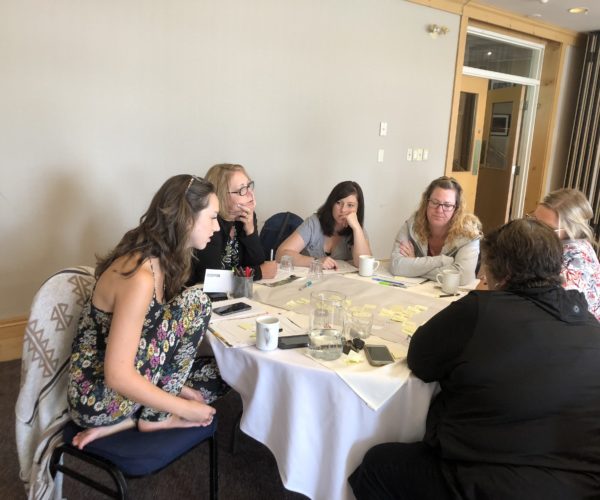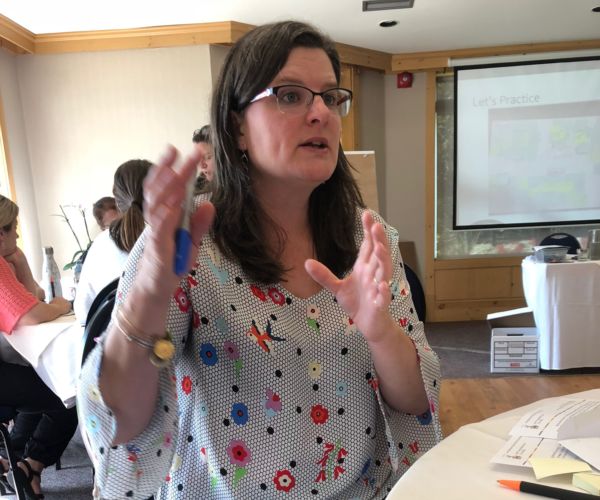Upcoming Institutes:
Contact us for opportunities for in-person or remote professional learning opportunities.
Available Sessions:
The following session overviews offer a high-level look at the “big ideas” that will be the foundation of each session. The group dynamic will play a critical role in shaping the content of each session.
Facilitator Training
If we want to create a culture of reflective practice and critical thinking, we have to focus on our role in facilitating conversations that can move us. Part of a reflective model in early learning is the role of the facilitator. Knowing how to facilitate conversations is a critical element of learning together. Good facilitation can deepen and enrich conversations, supporting the process of learning together. This session will deepen participants’ understanding of the role of facilitation in promoting group participation, ensuring equity and building trust with a community of learners. We will explore strategies for deep listening, questions that can move us and practice with protocols that can encourage thinking.
Working from a Place of Value – Considering our Image of Children
This session will reflect on the powerful factors that influence our image of children and how our beliefs about children affect every decision we make in the classroom – how we design our curriculum, organize our environments, and form relationships with children and families. Participants will consider the lens and scripts we use and how these can foster a sense of belonging and wellbeing in young children and helping them to develop a deeper understanding of themselves and their competencies.
Meeting Up with Children’s Lively Minds
This session will look at the complexities of working with young children. We will study the joy and intellectual engagement that meeting up with children’s lively minds can bring us. Understanding the details of children’s play and brain development can help us design children’s care. Using a thinking lens, we will explore the powerful role we play in early learning and development.
Authentic Language (Enterprise Talk)
Do you ever feel like the classroom police? In this session we will explore how we can use our scripts as a tool in communicating with children in times of difficulty by responding with effective positives. Enterprise Talk, developed by Tom Drummond, can support educators in communicating values that reflect the kind of community they are trying to build with children and families. Enterprise Talk has proven to be one of the most powerful communication tools for educators.
The Art of Observation
Observation isn’t a new idea for us in our field. We all know that observation is an important part of our practice. Have you ever asked yourself… If children are interested in everything, how do I know what to observe? What are children really learning as they play? How do I know what to look for? If you have, you are not alone. This session will delve into observation as way of research, a way to see competencies of children, and a way to grow a practice of listening. We will also explore how our observations can be used as a way to grow our practice.
Documentation and Interpretation
Observing, documenting and interpreting children’s learning is among the most critical skills an educator can develop. Documentation brings visibility to the teaching and learning process and deepens our understanding of each other. It can help educators build intentionality in their decisions, develop closer relationships with children and families, and support authentic assessment. Participants will have the opportunity to learn about various forms of documentation and protocols to consider when developing documentation.
Designing Engaging Learning Environments – Understanding our Roles in Supporting Complex Play
The environment is a reflection of our values, our beliefs and our observations of children in our care. Designing rich learning environments requires us to understand both the macro and micro elements of our spaces. Participants will explore how the foundations of HDLH can influence and impact how we design space and consider principles that can be used to provide invitations, transform space and understand our role as educators in the environment. We will also delve into how our roles are evolving in the classroom.
Deepening our Understanding of Pedagogical Documentation
There is a difference between documenting and documentation. This session is designed for participants who have been documenting children’s learning and want to deepen their understanding of how documentation can be used to inform and develop curriculum. Participants will be asked to bring documentation to share and reflect on in small learning communities.
Creating Natural Connections
This session will deepen our understanding of the critical importance of big body play both indoors and out. Together we will explore the principles of active body play and discover ways to support building risk competence with children. We will move beyond what we know about developing the five senses and learn more about the proprioceptive and vestibular systems in connection with brain development.
Leadership Series
One of the greatest ways to grow capacity in a community or organization is the development of professional learning communities. These multi-part series are uniquely designed and developed following a reflective model for learning.
The Pedagogical Leadership series is composed of a minimum of six 3-hour sessions or three full day sessions, focusing on the following topics:
- Working from a Place of Vision and Values
- Developing Meaningful Relationships
- Considering the Role of Learning in our Everyday Practice
- Nurturing Dispositions for Learning
- Creating a Culture of Observation and Research
The Reflective Practice at Work series is composed of a minimum of six 3- hour sessions or three full day sessions focusing on the following topics:
- Working from a Place of Value – Considering our Image of Children
- Meeting Up with Children’s Lively Minds
- Authentic Language (Enterprise Talk)
- The Art of Observation
- Documentation and Interpretation
- Designing Engaging Learning Environments – Understanding our Roles in Supporting Complex Play






